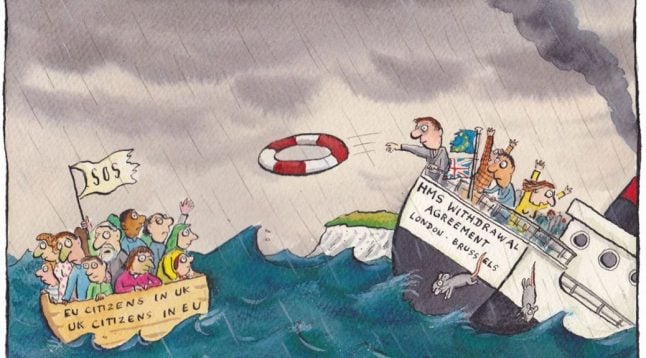British in Europe:
Citizens’ rights organisations British in Europe and the3million, who represent the five million people most directly affected by Brexit, demand an immediate end to crippling legal uncertainty in the wake of an agreed extension to the Brexit process until 31 October.
While the Withdrawal Agreement on citizens’ rights has been gathering dust for over a year all 28 EU member states are busy making their own, widely differing preparations on how to treat the five million people who have crossed the Channel to live in another EU country.
These five million people demand an urgent explanation as to why EEA EFTA and Swiss citizens already have security about their rights, but they do not. They also plead with the EU to not waste the hard work that went into agreeing citizens’ rights and uphold them even in case of no deal.
With the extension agreed last night, we are still living in limbo. It is now time to ring fence our rights and let us get on with our lives…read our joint statement with @the3million here:https://t.co/v9JrptzYEC pic.twitter.com/KYtHYM5ayr
— British in Europe (@BritishInEurope) April 11, 2019
Jane Golding, Co-Chair of British in Europe – which represents 1.3mn Britishcitizens living on the continent – said: “This may be the last chance before the European elections to show the five million people who used their free movement rights in good faith that they matter more than fish carcasses or Cheddar cheese.
“As almost a third of only 17 million Europeans who currently use their free movement rights, what message does it send for the future if the EU fails to protect their rights in this unprecedented situation?
“We need a binding commitment now from both sides that rescuing the hard won citizens’ rights part of the Withdrawal agreement will be the contingency, instead of the current contingency plans providing for 28 separate unilateral solutions without international treaty protection.”
It is unlikely that any post-no-deal-Brexit agreement on citizens' rights would have the same scope and rights as the Citizens' Rights part of the Withdrawal Agreement – and it could take years to negotiate.
The current EU no-deal contingency plans for British citizens in the EU amount to little more than calling on Member States to ‘be generous’. This approach also leaves the 3,6 million EU citizens in the UK at the mercy of the UK government, which has already announced that their rights will be cut in a no-deal scenario.
Without the protection of an international treaty, future Britishgovernments will be free to reduce these rights even further. In addition, the campaign groups argue that dealing with areas like healthcare, pensions and social security will require a coordinated approach at EU-UK level.
For more information on British in Europe CLICK HERE.

Brexpats Hear our Voice:
We fully endorse British in Europe and the3million’s demand today for “an immediate end to the crippling legal uncertainty in the wake of an agreed extension to… …31 October 2019”.
Business aside, there needs to be more awareness of how this affects people. Every week has been bringing us new worries since our lives were turned upside down, astonishingly close to three years ago.
This week of no deal?, short extension?, long extension?… has been one of the worst. How much more of hanging over the abyss, living with uncertainty do they think people can take?
Our members are in countries that span from Spain to Finland, France to Bulgaria, Ireland to Estonia, Greece to the Netherlands… Stereotypes abound but we are more likely to gravitate to where the work is than to the bowling club or the beach, as almost 80% of UKinEU are of working age or younger.
Our members are from all backgrounds, perhaps employed or self-employed; families with young children or carers for older relatives; economically comfortable or economically challenged… in fact, all manner of situations, rather like “real people”! Many of us care very much about the UK and our family and loved ones there.
But the referendum set us and all EUinUK citizens apart. We are particularly concerned for the most vulnerable amongst us. By definition, that must include many of the 3 million+ EU citizens for whom it is very hard to be impervious to Theresa May’s ever hostile environment.
For many of our members the extension offers relief we are still in the EU, and hope but for others it is an even darker place or feelings are mixed.
Michael, Germany: “The cause of Remain is still alive…” Sue, France: “More time for more indecision and uncertainty…” Caomhin, Spain: “I like it because we haven’t left… I don’t like it because of the insecurity…” Mike, Italy: “Nothing has changed…” Christine, Spain: “Another six months of living on a knife’s edge…” Neal, Romania: “Underwhelmed…” Arthur, Hungary: “I am quite upbeat about it”. Lesley, France: “Good news and bad news all at the same time”. Linda, Belgium: “… I’m really sick of this (and I mean sick in all senses of the word – ask my doctor!)…” Chris, France: “My fear is that much of the damage to our country has already been done…”
No deal has been excused from the table this week so our battle for ring-fencing must go on. Or even better, revoke article 50 forthwith; it was after all, a highly dubious referendum.




 Please whitelist us to continue reading.
Please whitelist us to continue reading.
Member comments